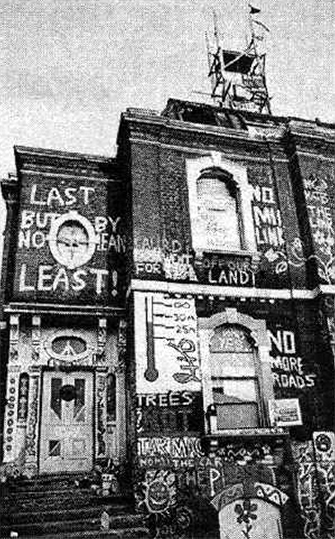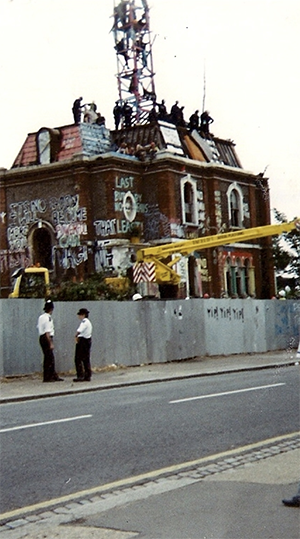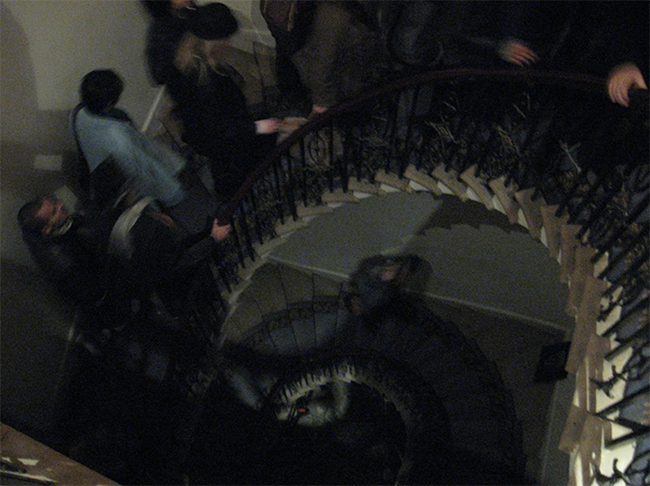ONYEKA IGWE
I have a ‘sliding doors’ story.
Two women, grow up roughly at the same time, in the same part of North East London. Their histories faintly mirror: early adventures playing on the Wanstead Flats, Saturdays in the shadows of mothers haggling at East Street Market and everlong teenage meanderings down Romford Road. They arrive at 188 Grosvenor Square. Mayfair, London on the same day, at the same moment. They don’t even notice each other.
Their childhoods were spent in the mid nineties, in the shadow and aftermath of the squatted communities of the M11 link road protest camps. Protestors campaigning against the construction of a new motorway created micro-nations with names like Munstonia and Wanstonia across the area, building community with the locals, including a lone 92 year old resident holdout of the government compulsory purchase orders named Dolly Watson. Our protagonists weren’t quite old enough or present enough to remember the squats themselves with any kind of clarity but the freedom of that living seeped into them. It was redolent in the atmosphere of the three intersecting outer London boroughs they circumnavigated. One of them thinks this must be the explanation for her persistent desire for communal living.


L: Munstonia, the last house on Fillebrook Road, in 1995, during the M11 Link Road protests. R: The eviction of Munstonia.
The moment of intersection is October 2008, a midpoint in ‘The Great Recession’. Politics is on the tip of their tongues, in both crytalising and oblique ways. They are both lost, looking for anchor(s); a vocation, a calling or at least a home.
They are separated by three years and five months — an Aries and a Virgo. One has just finished sixth form college and the other has recently returned to London from time away at university in another part of the country, a part they didn’t know existed until they were there.
One of them is nervous. She dilly daddles outside the front of the building, reading the ‘literature’ on display — zines, leaflets and propaganda. She feels out of place, sensing the whiteness of the room even before she opens the door. She is black and alone, here. She wonders why she didn’t ask anyone else to come with her, why she never thinks of it. She remains in the well of the staircase summoning courage to climb the stairs and participate in this thing she has always been curious about, always needed.
The other, perhaps we might say, has the energy, naivety and gumption of the eighteen year old that she is. She doesn’t know the rules, or recognise the sneers she will surely encounter once she enters. She is wearing the wrong clothes, has the wrong accent and is ignorant of the right terms. She is oblivious to these social cues, or she has been trained, by her performing arts background (another thing they both share), to pretend that she does not notice.
The older woman does eventually make it up the stairs but her incongruity consumes her, dampening her reserves of confidence. She cannot open her mouth to respond to any entreats that might lead to a conservation, so she does not charm, and is charmed by no one. Instead she sits for a while, sees through smiles and then ghosts, returning to the shared flat she rents in the east of the city. She never comes back.
The younger of the two bounds up the stairs, asks questions and catches the eye of an older man (of course!). That man invites her in, attracted by her sweetness, and for the next five years she squats, with him, and others that she meets here or through here, across London in homes with names like THE GYM or COLORAMA.

The staircase at 188 Grosvenor Square.
They could have met here, but they don’t. They meet at another communal home in North East
London four years later, when the dreams of collective living, for them both, have warped,
romanticised, subsisted, morphed, extinguished and petrified.
Now they are old friends.
—
Onyeka Igwe is an artist and researcher working between cinema and installation, born and based in London, UK. Through her work, Onyeka is animated by the question — how do we live together? — with particular interest in the ways the sensorial, spatial and non-canonical ways of knowing can provide answers to this question. She uses embodiment, archives, narration and text to create structural ‘figure-of-eights’, a form that exposes a multiplicity of narratives. Her works have been shown in the UK and internationally at film festivals and galleries. She was awarded the New Cinema Award at Berwick Film and Media Arts Festival 2019 and the 2020 Arts Foundation Fellowship Award for Experimental Film. Onyeka is part of B.O.S.S., a sound system collective that brings together a community of queer, trans and non binary people of colour involved in art, sound and radical activism as well as a curatorial and research initiative on alternative and anti ethnographies, together with Rachel Rakes and Laura Huertas Millán.
